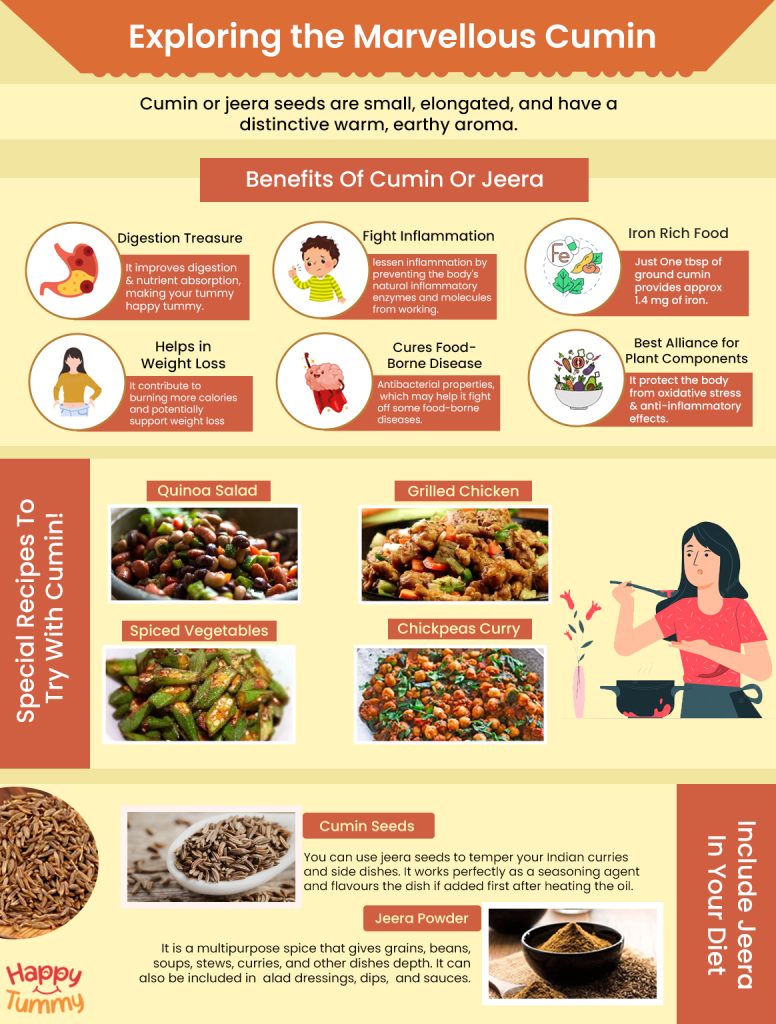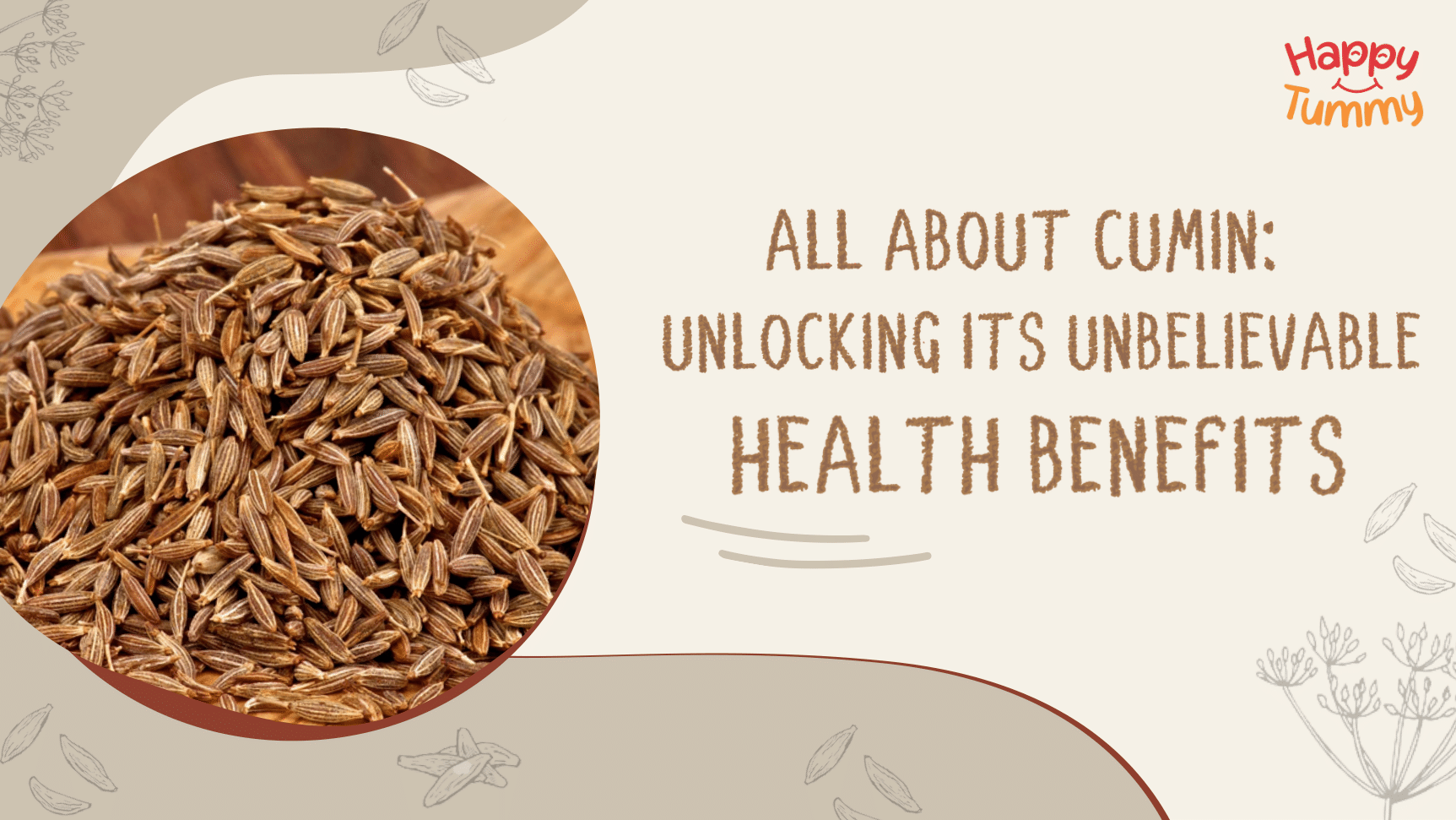Table of Contents
There is something special about Indian cooking – its spices. Spices are the heart and soul of every dish regardless of the state, region, or any specific area’s cuisine.
In a world where spices reign supreme, one jewel shines brighter than the rest—a true enigma wrapped in a fragrant mystery.
Cumin or Jeera is so versatile and fragrant, loaded with astonishing health benefits, that it can be considered the superhero of the culinary world.
Cumin has been enticing taste buds and curing bodies for millennia. It has a long history and a staggering array of wellness benefits.
From its ancient origins in the heartlands of the Middle East to its widespread use in cuisines around the globe, cumin has earned its rightful place as a powerhouse of both flavour and well-being.
So, if you are a health freak looking for excellent weight management options or a flavour adventurer always searching for something tasty, you have come to the right place.
So, my adventurous companions, tighten your aprons, open your minds, and get ready to embrace the enchantment of cumin—where taste meets triumph and wellness knows no bounds.
Be prepared to be captivated by its enticing aroma and astounded by its transformative effects on your well-being.
Let’s embark on this thrilling expedition and unlock the secrets of Jeera’s unbelievable health benefits together!
Exploring the Marvellous Cumin
A blooming plant in the Apiaceae family, cumin is also known by its scientific name, Cuminum cyminum.
It is primarily cultivated for its seeds and used as a spice in various cuisines worldwide. Cumin or Jeera seeds are small, elongated, and have a distinctive warm, earthy aroma.
It has been used for thousands of years in some parts of Southwest Asia and the eastern Mediterranean, where Jeera originated. It is now grown worldwide, especially in India, Iran, China, Mexico, and the Mediterranean.
Dive into the Stunning Health Benefits of Jeera (Cumin)

Jeera has been prized for its potential health advantages and culinary purposes. Antioxidant, anti-inflammatory, and digestive qualities are thought to exist in it.
Jeera is a good source of essential minerals like iron, manganese, calcium, and vitamins like C and A. Let’s look at some of its benefits below:
1. Looking for a Digestion Treasure for your Happy Tummy – Jeera is Your New Friend
It is no surprise that Jeera has long been recognized for its positive effects on digestion.
It is commonly used in India as an all-natural remedy for digestive issues. Also, the constituents in Jeera seeds boost the digestive system’s ability to produce the enzymes required to digest proteins, carbohydrates, and fats.
It improves digestion and nutrient absorption, making your tummy happy tummy. [1].
If you don’t know it by now, these tiny Jeera seeds you have been using daily possess carminative properties, which means they can help relieve gas, bloating, and discomfort in the gastrointestinal tract.
Moreover, it also has mild laxative properties and can help promote regular bowel movements.
And if that is not all, cumin may help alleviate symptoms of acid reflux and heartburn by reducing the production of stomach acid. It can relieve the burning sensation and discomfort associated with these conditions.
Digestive Quotient Test
A tiny seed that can help you solve your daily digestive problems with just a snap of your fingers. No wonder this seed is so incredible.
And if you are looking forward to elevating your digestive health, you should try the digestive quotient test by Aashirvaad Atta with Multigrain.
You will get your digestive score out of 100 in seconds by answering simple questions. Do try it now.
2. Searching for Iron-Rich Foods – Include Cumin in Your List
Yes, cumin is considered a good source of iron [2]. The creation of red blood cells and oxygen distribution throughout the body are two critical biological processes that depend on iron, a necessary mineral. Jeera seeds contain a moderate amount of iron.
Just one tablespoon of ground cumin provides approximately 1.4 milligrams of iron, about 17.5% of the recommended daily intake for adults.
Moreover, Jeera also contains compounds that may enhance iron absorption in the body.
It has vitamin C, which can improve absorption with non-heme iron (found in plant-based foods like cumin).
And if you are someone following a vegetarian or vegan diet, it is time to be friends with Jeera, as it is an essential source for meeting all your iron needs.
3. Cumin, Your Best Alliance for Plant Components
Jeera is a good source of various beneficial plant components contributing to its potential health benefits [3].
First, Jeera has multiple phytochemicals, including terpenes, flavonoids, and phenolic compounds.
Moreover, these plant compounds all have antioxidant properties that protect the body from oxidative stress and anti-inflammatory effects.
4. Jeera (Cumin) helps in weight management
You may have heard people discussing drinking Jeera water to reduce belly fat [4].
Yes, it is true; Jeera can do wonders regarding weight management.
Cumin has been suggested to have thermogenic properties, which may help increase the body’s metabolic rate. Also, a higher metabolic rate can contribute to burning more calories and potentially support weight loss efforts.
Moreover, Jeera is also rich in fibre which supports brilliantly in regular bowel movements and improved digestion. Improved digestion and regular bowel movements may indirectly support weight management.
My Meal Plan
If you wish to know how much fibre content is in Jeera dishes, check it out on My meal plan. An excellent platform launched by Aashirvaad Atta with Multigrain, where you can check the fibre ratio present in every food you consume.
5. Cumin helps to fight Food-Borne Infections
It has been noted that cumin may possess antibacterial properties, which may help it fight off some food-borne diseases [5].
It contains substances with antibacterial characteristics, such as cuminaldehyde and thymol.
These compounds have been shown to inhibit the development of several dangerous bacteria and fungi, including those responsible for food-borne diseases.
6. Jeera helps to Fight Inflammation
Jeera has been traditionally used to address inflammation-related conditions [6]. It includes substances with anti-inflammatory effects, including cuminaldehyde and thymol. These substances may lessen inflammation by preventing the body’s natural inflammatory enzymes and molecules from working.
Antioxidants such as flavonoids and phenolic compounds are abundant in Jeera. Additionaly, Antioxidants aid in defending cells from the harm of inflammatory chemicals called free radicals.
By neutralizing free radicals, Jeera’s antioxidants may help alleviate inflammation.
How to Include Jeera in Your Diet?
Jeera can be used in various ways to add flavour to multiple foods. Here are a few common ways to use cumin:
- Jeera Seeds – You can use Jeera seeds to temper your Indian curries and side dishes. It works brilliantly as a seasoning agent and flavours the dish if added first after heating the oil. Cumin seeds are cooked in a skillet with hot oil or ghee until they crackle and smell good. To give rice recipes, vegetable stir-fries, and lentil soups their distinct flavours, tempered cumin can be added.
- Cumin Powder – Ground cumin is readily available and can be used directly in cooking. It is a multipurpose spice that gives grains, beans, soups, stews, curries, and other dishes depth. It can also be included in salad dressings, dips, and sauces. The whole cumin seeds can be roasted on a dry skillet until fragrant, and then they can be ground in a mortar, pestle, or spice mill to create Jeera powder at home. Additionally, check out the Aashirvaad spice range on an excellent quality Jeera powder.
Also read – Benefits of Shah Jeera
Unique Recipes to Try with Cumin!
Here are some cumin-based recipes you may try right now:
- Cumin-spiced vegetables – Combine your favourite vegetables with salt, pepper, cumin powder, and olive oil in a bowl. They should be spread out on a baking sheet and baked at 400°F (200°C) until soft and brown.
- Quinoa salad flavoured with cumin– Follow the package instructions to prepare the quinoa, then set aside to cool. Combine the cooked quinoa with the diced cucumbers, tomatoes, fresh herbs, and cheese in a big bowl. Dress with salt, pepper, cumin powder, olive oil, and lemon juice.
- Cumin-spiced grilled chicken – For at least 30 minutes, marinate chicken breasts in some lemon juice, olive oil, minced garlic, ground cumin, paprika, salt, and pepper. To achieve even cooking and the appearance of grill marks, turn the chicken over once while it is cooking on a prepared grill or grill pan.
- Cumin-spiced chickpea curry – Heat the oil before adding the minced garlic, grated ginger, and chopped onions to the oil in a big pan. Sauté until fragrant and golden. Cumin, coriander, turmeric, and chilli powder should be added. Stir well to coat the onions and spices. Add coconut milk, diced tomatoes, chickpeas, and a dash of salt. Simmer until the flavours meld together, and the curry thickens.
Are There Any Cumin Side Effects You Should Be Worried About?
When used in moderation in recipes, cumin is generally safe and well-tolerated by most people. Some individuals, however, may develop particular adverse effects or allergic responses. Here are a few things to think about:
- Allergic Reactions: In rare cases, individuals may have an allergic reaction to cumin. It may show signs of skin rashes, itching, hives, swelling, or breathing problems. Stop using cumin and get medical help if you think you could be having an allergic reaction.
- Blood Thinning: Jeera contains compounds that may have a mild blood-thinning effect. While this is generally not a concern for most people, individuals with bleeding disorders or those taking such medications should exercise caution and consult a healthcare professional.
- Drug Interactions: Jeera may interact with certain medications. It is best to speak with a healthcare provider if you take any medications to be sure there aren’t any potential interactions.
Ending Thoughts for Cumin
As we bring our journey through the captivating world of cumin to a close, it’s clear that this unassuming spice holds extraordinary power.
From its rich history to its remarkable health benefits, cumin has proven to be a true marvel in flavour and wellness.
Whether tantalizing your taste buds, supporting digestion, or contributing to overall well-being, cumin has shown versatility and prowess.
So, the next time you reach for that jar of cumin, remember the incredible journey we embarked on together—unveiling the secrets, unravelling the mysteries, and unlocking the unbelievable health benefits.
Let cumin be your culinary companion, wellness ally, and passport to a vibrant, flavorful life.
Embrace the magic of Jeera, and let its aromatic charm enrich your culinary creations and nourish your body and soul. Cheers to your flavourful and vibrant journey ahead!
FAQs
Yes, consuming Jeera can have several benefits for our bodies. It can support digestive health and aid in nutrient absorption. Anti-inflammatory and anti-microbial qualities abound in it. Most importantly, it aids in the process of weight loss.
Although Jeera is safe to be consumed by everyone, people with allergies specific to Jeera or its family should restrict from eating it.
The use of cumin extends back to antiquity. As early as 2,000 BCE, it is thought to have been grown and utilized as a spice in Egypt, Mesopotamia, and other parts of the Middle East. It has been mentioned in ancient Egyptian texts, including the famous Ebers Papyrus, which documented medicinal knowledge.
Yes, Ayurveda highly supports the use of Jeera for various purposes. Jeera is considered a valuable herb in Ayurveda and is known by the Sanskrit name “Jiraka.”
The city of Unjha, located in Gujarat, India, is renowned for its association with cumin. Unjha is often called the “Cumin City” or the “Cumin Capital of India.”















